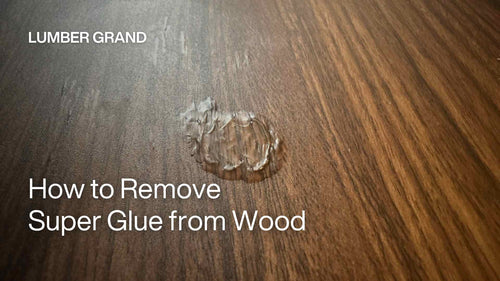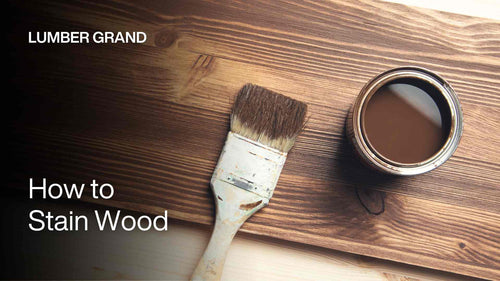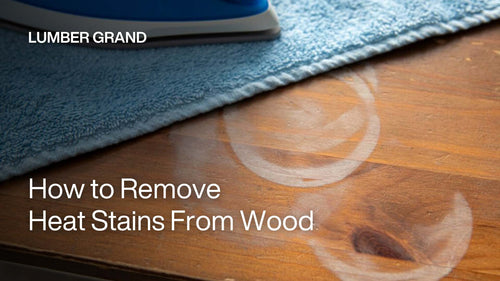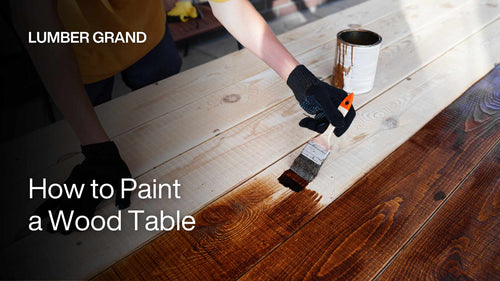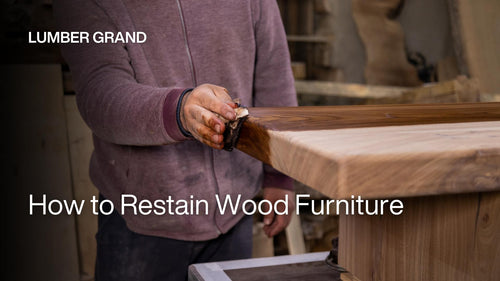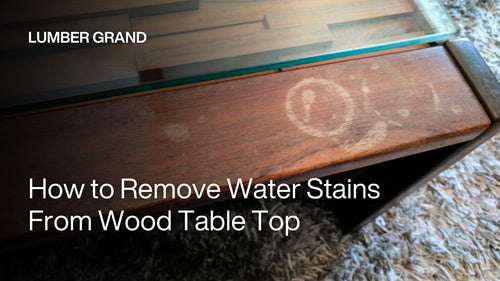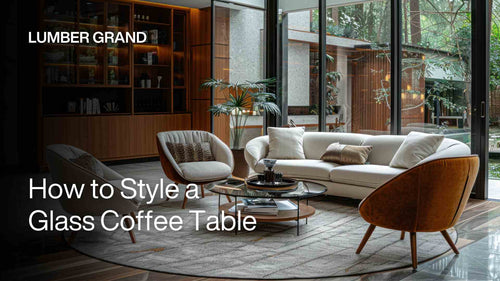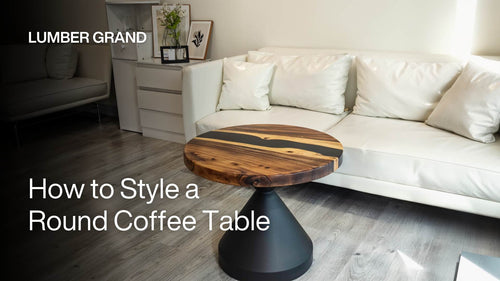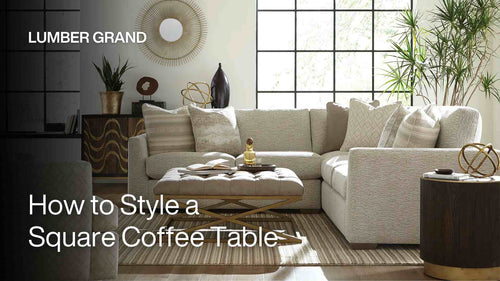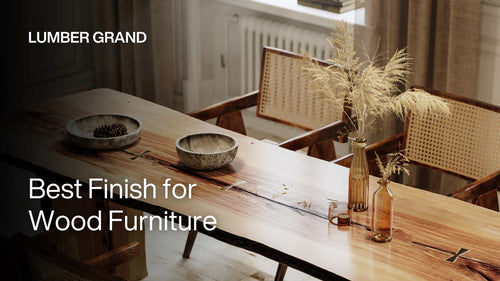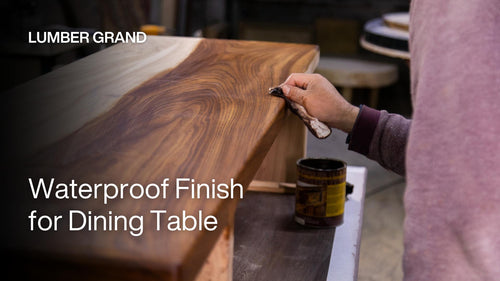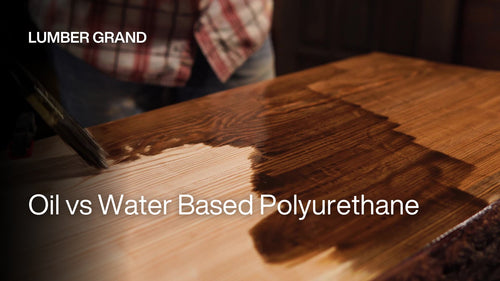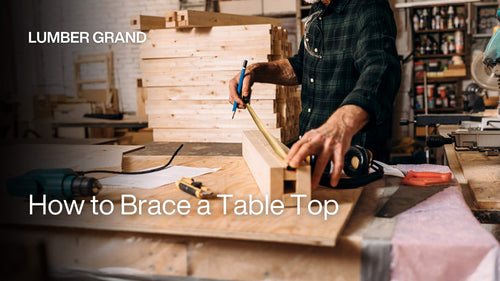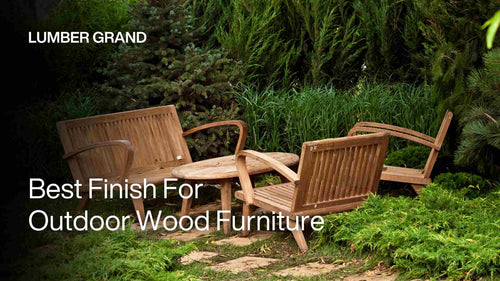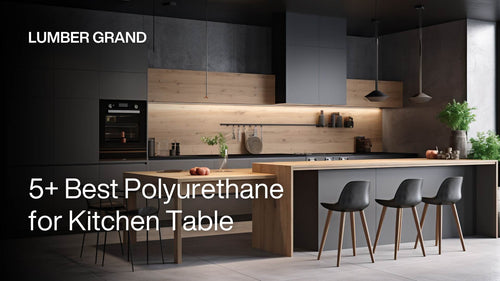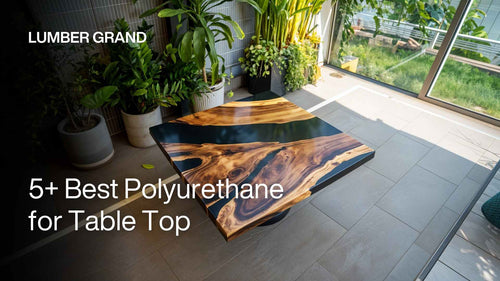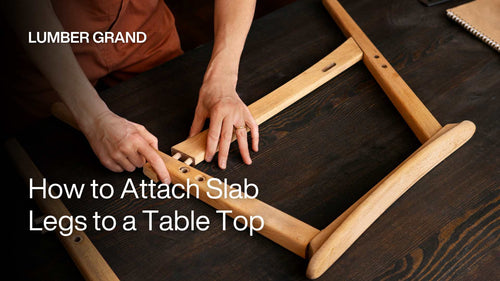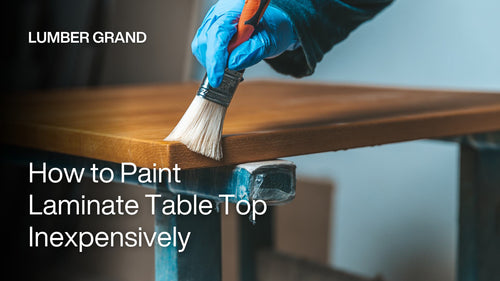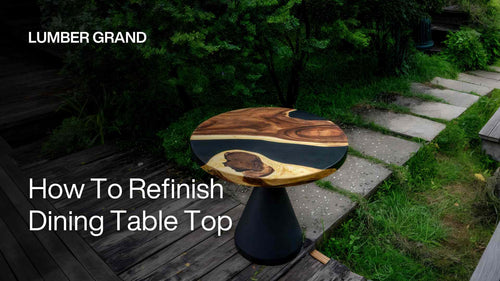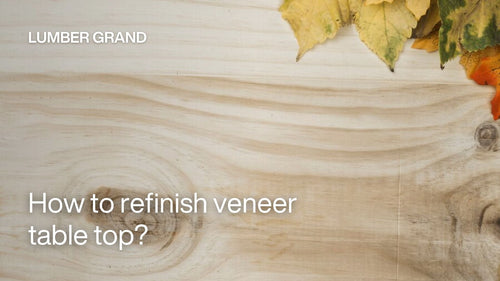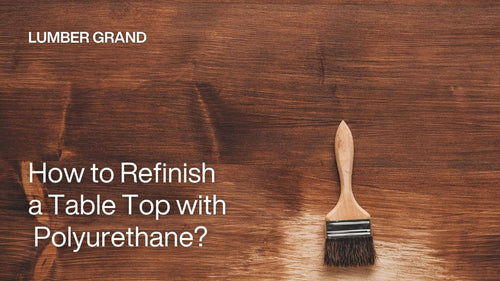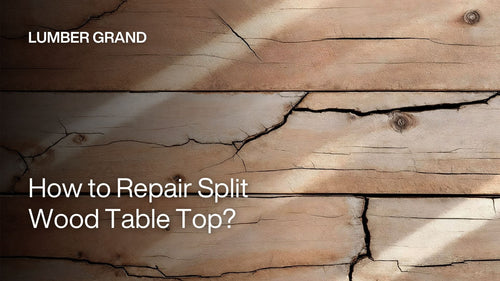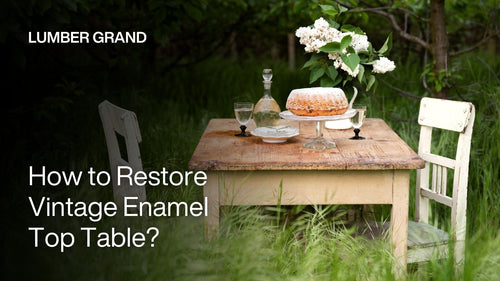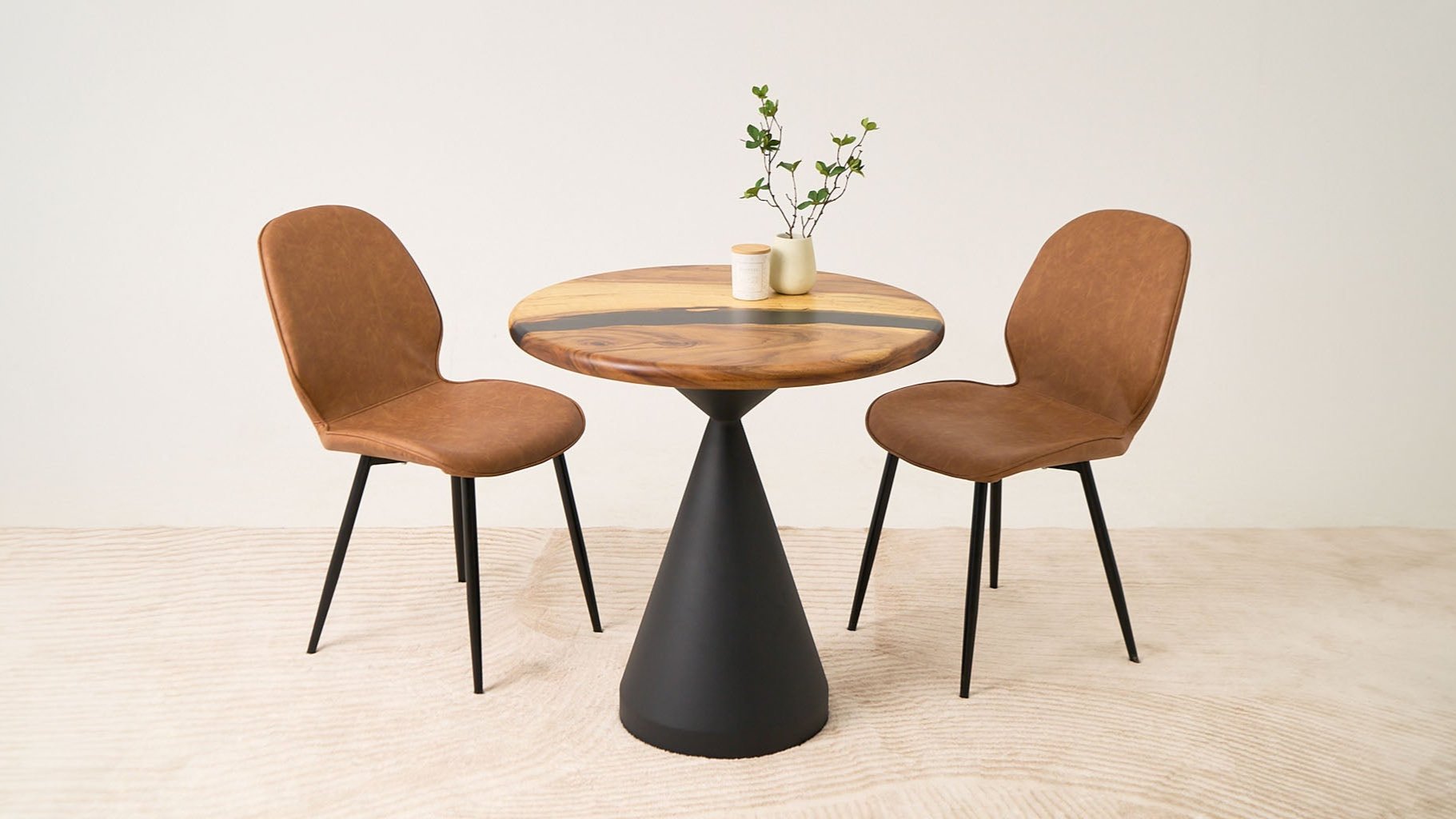The best finish for dining table is always a question many ask when they want to keep the natural beauty of a wood table. The right finish doesn’t just add style. It will protect against water, scratches, and everyday wear.
With years of working with wood, Lumber Grand has rounded up 5 top picks that are trusted and widely used: polyurethane, epoxy, varnish, lacquer, and oil. Each brings its own look and feel, from a sleek, glossy shine to a warm, natural wood vibe. If you’re looking for the perfect solution or planning to resurface wood table, you’re in the right place. Let’s dive in!
Best Finish for Dining Table: Quick Comparison Table
We've combined the best wood finish for dining table into one handy chart so you can compare them at a glance. Prices can vary with time, so check your local market for the most accurate info before purchasing.
|
Finish type |
Durability |
Water Resistance |
Aesthetics |
Ease of application |
Best for |
Cost range |
|
Polyurethane |
Very durable, scratch-resistant |
Good |
Available from satin to gloss, a modern look |
Requires brush/roller, several coats |
Long-lasting, low-maintenance tables |
$15 — 40/quart |
|
Epoxy resin |
Super durable, thick, impact-resistant |
Excellent |
High-gloss, glass-like effect |
More technical, prone to bubbles |
Glossy, mirror-like model surfaces |
$40 — 120/gallon |
|
Varnish |
Durable and UV-resistant |
Good |
Slight amber tone, warm and classic |
Applied in multiple thin layers |
Traditional, rustic, or vintage tables |
$20 — 50/quart |
|
Lacquer |
Smooth finish, less resistant to heat/UV |
Moderate |
Sleek, ultra-smooth, polished look |
Dries quickly, usually sprayed |
Elegant, modern, or decorative projects |
$25 — 40/gallon |
|
Oil (tung / Danish / linseed) |
Needs regular reapplication |
Limited resistance |
Enhances natural grain, matte, or low sheen |
Very easy, wipe on with a cloth |
DIYers who love a natural, organic wood feel |
$15 — 40/quart |
Read more: Waterproof Finish for Dining Table
4 Key Factors Make the Best Finish for Dining Table
Your dining table faces daily use, spills, and food contact, so it deserves a lasting finish. Consider these four factors to find what is the best finish for a dining table top.
-
Durability: Durability is the most important factor since your dining table needs protection from scratches, stains, and spills. When it comes to strength, epoxy and polyurethane are the top choices.
-
Aesthetic: You'll want to choose a finish that fits the look you're going for when restain dining room table. For example, epoxy or lacquer is an excellent choice if you love a glossy, elegant vibe. Oil brings out the wood grain beautifully, while polyurethane offers a nice balance of durability and classic style.
-
Application and maintenance: Application and upkeep also play a role in finding the best finish for dining room table. Oil is easier to apply and touch up, while polyurethane needs multiple coats and more maintenance.
-
Health and safety: Some finishes, especially oil-based ones, can give off strong smells and VOCs (volatile organic compounds) while applying and waiting to cure. If you're worried about indoor air quality, using a water-based or low-VOC option is best.

How to choose the best finish for dining table
Credit: Lumber Grand
Shop now: Round Wood Epoxy Dining Table 41" Diameter
You might like: Best Finish for Wood Furniture
5 Best Finish for Dining Table That Last for Years
Every finish type contributes a distinct set of qualities. Lumber Grand is breaking down the five most popular finishes so you can easily see the pros and cons and choose the one that fits your dining table best.
1. Polyurethane: Best Finish for Daily Durability
Polyurethane is one of the most popular finishes for dining tables thanks to its durability and excellent resistance to water and scratches. It comes in 2 main types:
1.1 Oil-based
Oil-based polyurethane gives wood a warm, rich tone, though it will yellow over time. It's a great choice if durability is your top priority. The trade-off is the strong odor and higher VOCs, and it takes longer to dry than other finishes. Still, waiting a bit longer for that flawless finish is worth it.
1.2 Water-based
Conversely, water-based polyurethane may not last as long, but it dries clear, keeps the natural look of the wood on a natural wood table, and has a much lighter smell. It also dries faster and has lower VOCs, making you feel more comfortable about safety. The only catch is that water-based polyurethane often has a higher price tag.
-
Drying time: 6 — 10 hours (oil-based) and 2 — 4 hours (water-based) between coats, 24 hours for light use, complete cure in 48 hours
-
Popular brands: Minwax, Varathane, General Finishes, Target Coatings
-
Recommended use: Most hardwoods (like oak, walnut, and maple) need a durable finish. Since it preserves their natural color, water-based polyurethane is especially great for lighter woods (such as maple, ash, and birch).
-
Price range: around $15 — $40 per quart
|
Pros |
Cons |
|
Highly durable, resists scratches and everyday wear Excellent water and stain resistance Easy to clean and maintain |
Oil-based versions may yellow over time Require multiple coats Longer drying time (especially oil-based) |

Polyurethane finish
Photo: Freepik
Related blog: Oil vs Water Based Polyurethane
2. Epoxy: Best Finish for Glossy Protection
One of the best finish for wood dining table you can’t overlook is epoxy resin. Epoxy table top creates a thick, glass-like coating that offers outstanding protection against water, heat, and heavy impacts. It’s often considered the “super durable” choice for surfaces that see a lot of use.
Another plus is that epoxy can be tinted with different colors, letting you design a dining table that's truly one of a kind. However, epoxy coatings can be costly and challenging to apply flawlessly without bubbles.
-
Drying time: 6 — 12 hours for touch dry, complete cure in 72 hours
-
Popular brands: TotalBoat, Pro Marine, Stone Coat Countertops
-
Recommended use: Perfect for solid wood slabs (live edge tables) or tops with cracks and voids that need filling. It is not recommended for thin surfaces or tables prone to warping since epoxy is quite heavy.
-
Price range: around $40 — $120 per gallon
|
Pros |
Cons |
|
Extremely durable, with excellent strength and waterproof protection Creates a luxurious, glass-like, glossy finish Perform well even in humid environments or with heavy daily use |
More complex to apply, and prone to bubbles if not done carefully Higher cost compared to other finishes Difficult to repair once scratched or damaged |

Epoxy gives your table a striking, standout look
Credit: Lumber Grand
Shop now: Square Black Epoxy Dining Table 29" x 29"
Find Your Perfect Match: The Square Table Top - Designed to complement your unique space
3. Varnish: Best Finish for Classic Strength
A classic treatment that gives the wood table top a classic, natural look is varnish. Its exceptional durability and UV resistance make it suitable for indoor and outdoor use. Spar varnish especially offers excellent UV resistance and withstands harsh conditions.
However, varnish has the disadvantage of taking longer to cure and may require more than one layer for complete protection. You'll also need to sand between layers lightly to ensure proper adhesion.
-
Drying time: 30 — 90 minutes for touch dry, 24 hours to handle, complete cure in 7 — 14 days
-
Popular brands: Helmsman Spar Urethane, McCloskey Man O’ War
-
Recommended use: Great for outdoor wood or dining tables in open spaces like patios or verandas. It also works well on weather-resistant hardwoods such as teak, mahogany, or other durable species.
-
Price range: around $20 — $50 per quart
|
Pros |
Cons |
|
Brings a classic, elegant look Strong protection against heat, moisture, and sunlight Highly durable, suitable for both dining tables and outdoor furniture |
Slow drying time, with waiting required between coats Need lightly sanding between applications |

How to refinish dining table with varnish
Photo: Freepik
4. Lacquer: Best Finish for Sleek Shine
Regarding the best finish for the dining table, lacquer deserves a spot on the list. Lacquer is often used in high-end furniture due to its quick-drying ability and the smooth, glossy finish. It's usually applied with a spray gun to achieve an even surface.
The downside is that lacquer isn’t the most durable option. It can chip and crack over time despite its sleek appearance. In addition, it tends to have high VOC levels, so you’ll need to work in a well-ventilated space or outdoors.
-
Drying time: 30 minutes — 2 hours for touch dry, complete cure in 24 — 48 hours
-
Popular brands: Deft, Mohawk, Rust-Oleum Lacquer
-
Recommended use: Works well on veneer or fine hardwoods like walnut and cherry. An excellent match for modern-style dining tables where you want an ultra-smooth, high-gloss finish.
-
Price range: around $25 — $40 per gallon
|
Pros |
Cons |
|
Luxurious glossy finish that gives a high-end look Dries quickly, allowing multiple coats in a shorter time Easy to buff and restore minor scratches |
Less durable compared to polyurethane and epoxy Prone to damage from heat, spills, or alcohol Requires spray application for the best results |

How to restain your kitchen table with lacquer
Photo: Freepik
Read more: How to Refinish Dining Table Top
5. Oil: Best Finish for Natural Warmth
Oils penetrate deep into the wood, highlighting its natural grain and warm tones. They’re non-toxic, eco-friendly, and easy to apply by hand. Here are a few popular options you might like:
- Tung oil: soaks in easily, gives a subtle shine, and offers moderate water resistance
- Boiled linseed oil: absorbs faster than raw linseed oil, and provides the wood with a naturally warm glow
- Danish oil: a blend of oil and resin that penetrates deeply while creating a thin protective finish on the surface.
However, oil finishes aren't very durable and must be reapplied periodically to keep the wood looking its best.
-
Drying time: 12 — 24 hours for touch dry, can recoat in 24 hours, complete cure in 3 — 7 days
-
Popular brands: Tried & True, Watco Danish Oil, Hope’s 100% Tung Oil
-
Recommended use: Perfect for wood with beautiful grain, like walnut, oak, or cherry, as oils bring out the natural patterns. Ideal for dining tables with light use, or for anyone who loves a rustic, natural look.
-
Price range: around $15 — $40 per quart
|
Pros |
Cons |
|
Keep the rustic charm and highlight the wood’s natural grain Easy to apply, just wipe or brush on Can be reapplied easily Some are even food-safe once fully cured |
They don't offer as much protection as film-forming finishes like polyurethane or epoxy Needs periodic reapplication to maintain its look Not highly resistant to water or scratches |

Oil finishes are easy to apply and maintain
Photo: Freepik
Smart Tips for Perfect Wood Finish
Besides choosing the best finish for dining table, knowing how to apply it for perfect results is essential. These handy pointers will guide you through using and caring for your wood finish to make it look polished and last for years.
- Prep the surface: Ensure the surface is prepared correctly before making a dining table. Start lightly sanding, then wipe away all dust and stains with a clean cloth. Ensure the table top is completely dry and free of oils or contaminants to ensure optimal adhesion.
- Choose the correct application method: Each type of finish has its optimal application method. Lacquer works well when sprayed for an even coat, while varnish or polyurethane is usually applied with a brush. It's best to pour epoxy in thin layers and follow the recommended thickness.
- Curing and drying times: You should watch the cure time recommended by each product. Avoid placing heavy objects on the surface until the finish has fully cured to prevent damaging your table top.
- Ongoing care: Apply a moderate, pH-neutral cleaner and a soft, wet cloth to clean instead of abrasive pads or strong chemicals that degrade coatings. You also should use coasters, placemats, and trivets to shield the surface from heat and dampness.

Wipe down your table regularly to keep it looking beautiful for years
Credit: Lumber Grand
Shop now: Round Epoxy Dining Table 29" Diameter
Related blog: How to Pour Epoxy Table
FAQs
1. What is the Most Durable Finish for a Table Top?
The most durable finishes for a table top are epoxy resin and polyurethane (oil-based). These finishes create a strong protective layer on your table top, offering excellent resistance to water, scratches, and stains.
2. What Sheen Should a Dining Table Be?
Consider warm, rich stains or a glossy varnish if you love a traditional look. But if a modern style is what you're after, sleek lacquer or matte finishes are perfect.
3. What is the Best Way to Finish a Dining Room Table?
The best way to finish a dining table depends on your value: durability, natural beauty, or easy maintenance.
-
For durability: go with strong finishes like epoxy, polyurethane, or varnish.
-
For natural beauty: oils such as tung, linseed, or Danish are great choices.
-
For easy maintenance: lacquer or oil will be your go-to options.
4. Is it Better to Varnish or Wax a Table?
Varnish is better for tables that need high durability. It forms a hard layer on the wood's surface, better protecting it against water and scratches. Conversely, wax leaves a smooth, natural, and warm feel but is more prone to scratches and requires more upkeep.
Best Finish for Dining Table: Final Choice
Here’s our takeaway on selecting the best finish for your dining table.
-
Polyurethane — best finish for durability and everyday protection
-
Epoxy — best finish for a glossy, rock-hard surface
-
Varnish — best finish for outdoor tables or moisture-prone areas
-
Lacquer — best finish for a sleek, modern, high-gloss look
-
Oil — best finish for a natural, rustic feel that highlights wood grain
We hope you now have your own answer about what is the most durable finish for kitchen tables. With the right finish, you’ll enjoy both beauty and durability every time you sit down for a meal.
The best finish for dining table depends on what you value most: durability, looks, or easy application and maintenance. And now you’re all set to refinish your dining table right at home. Be sure to check out more fun DIY ideas on our blogs!











